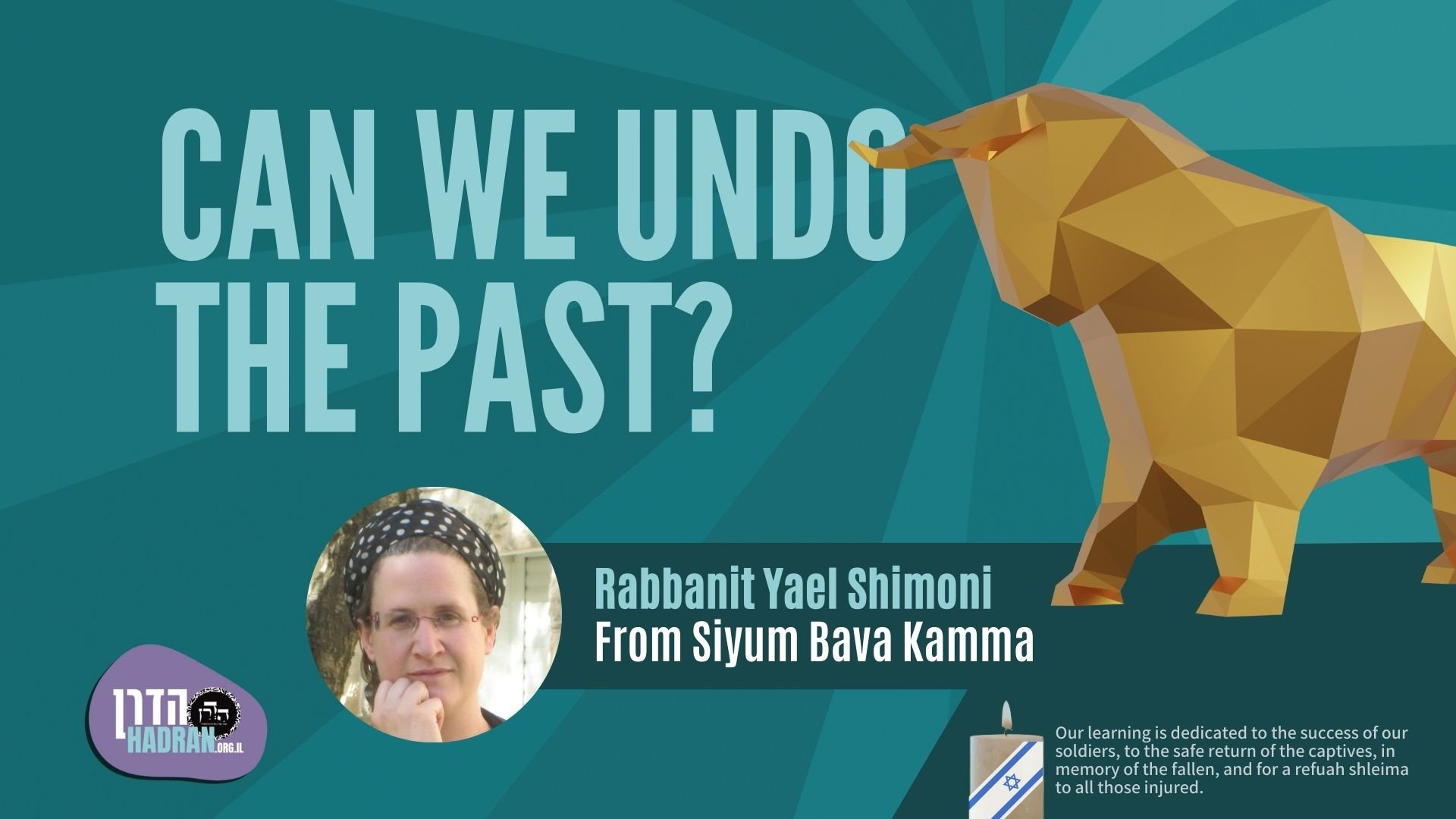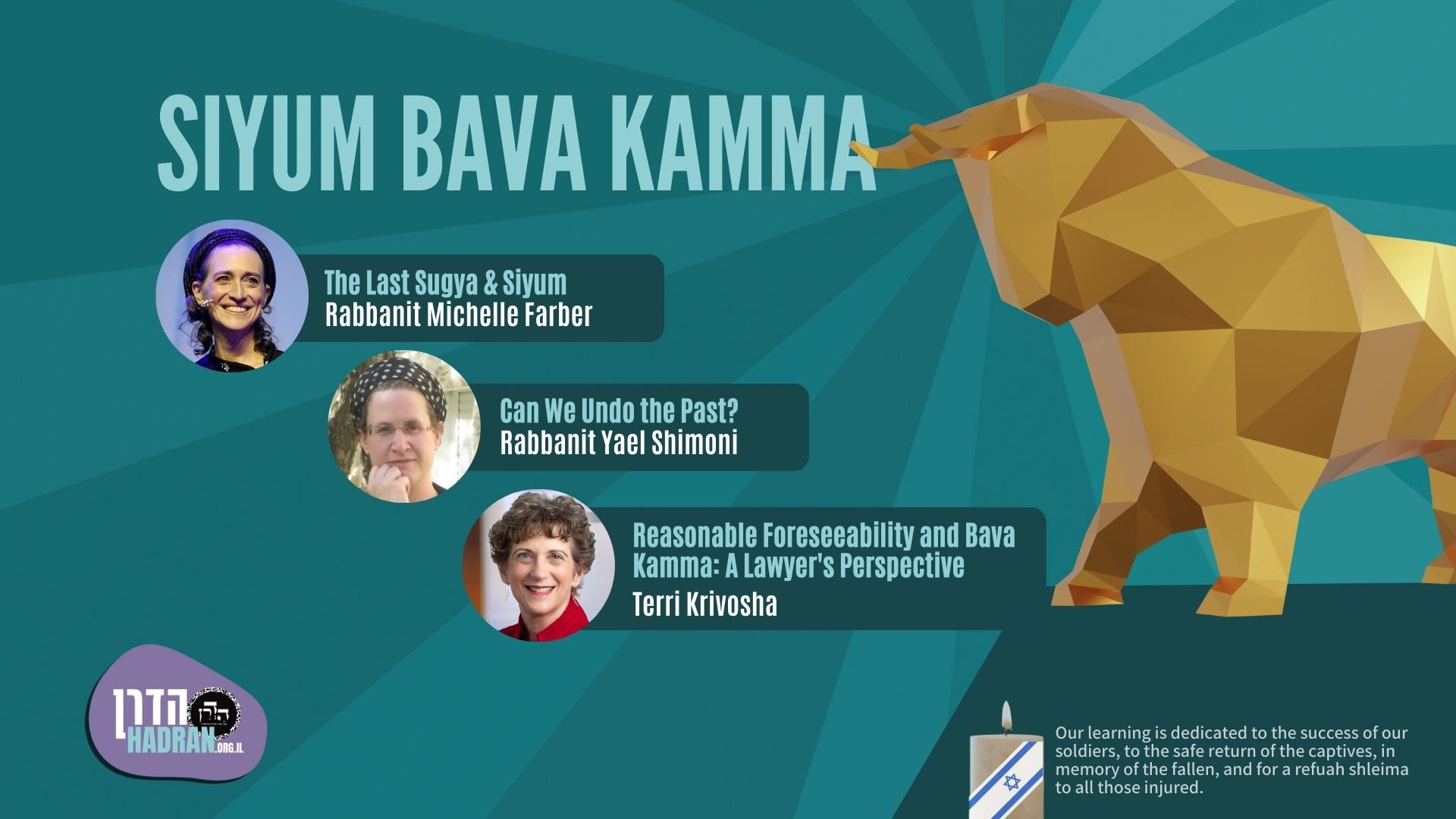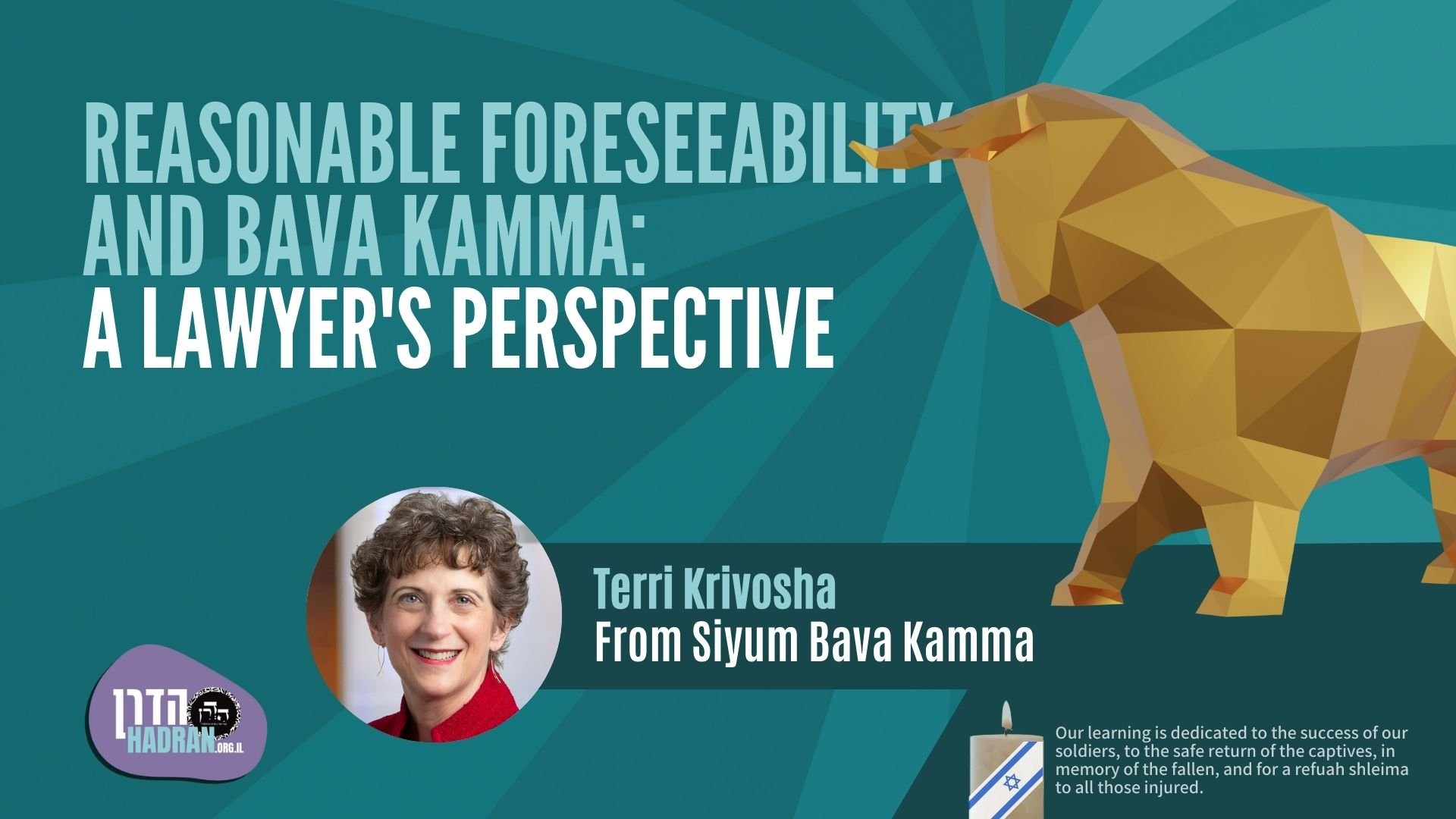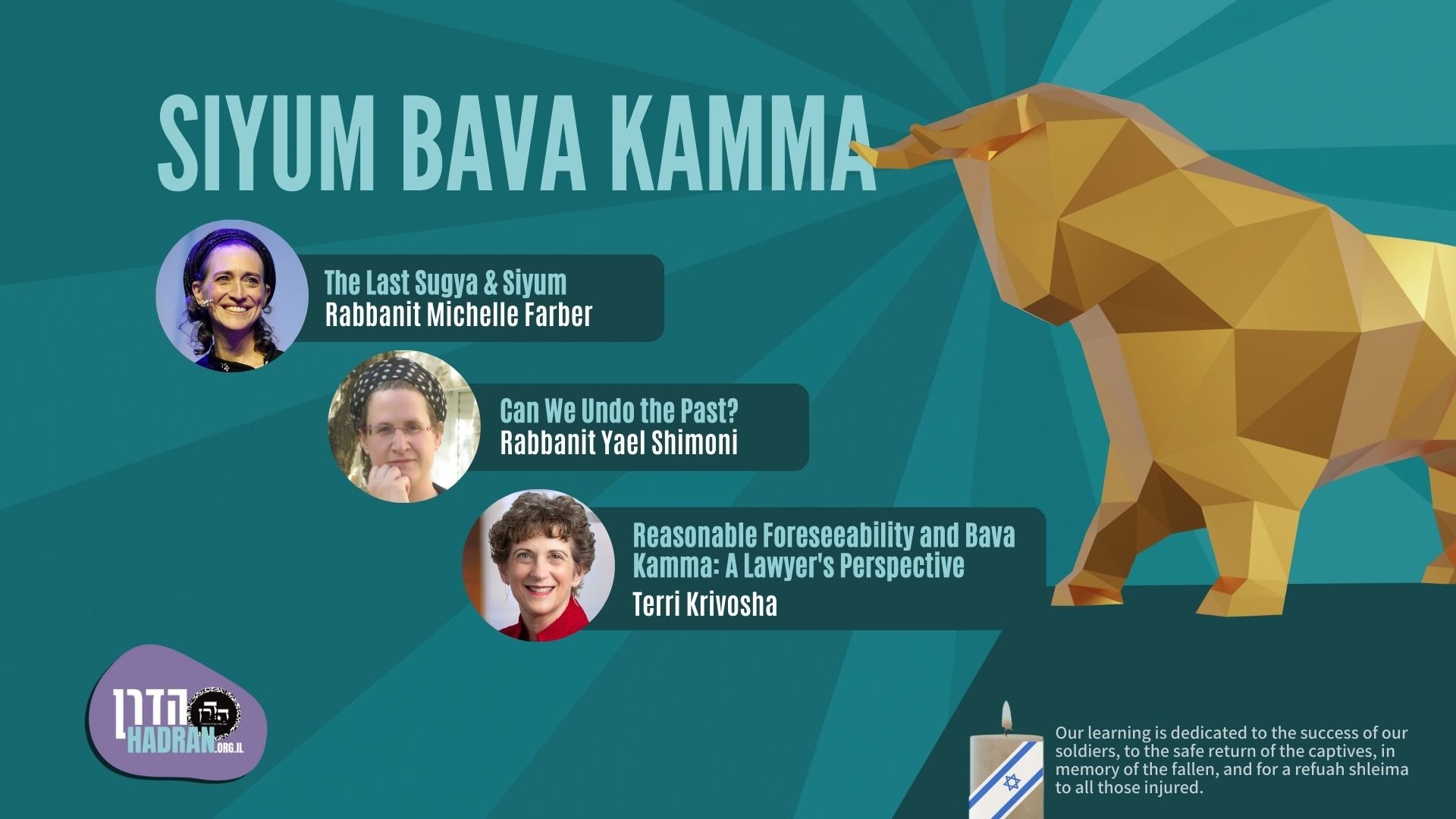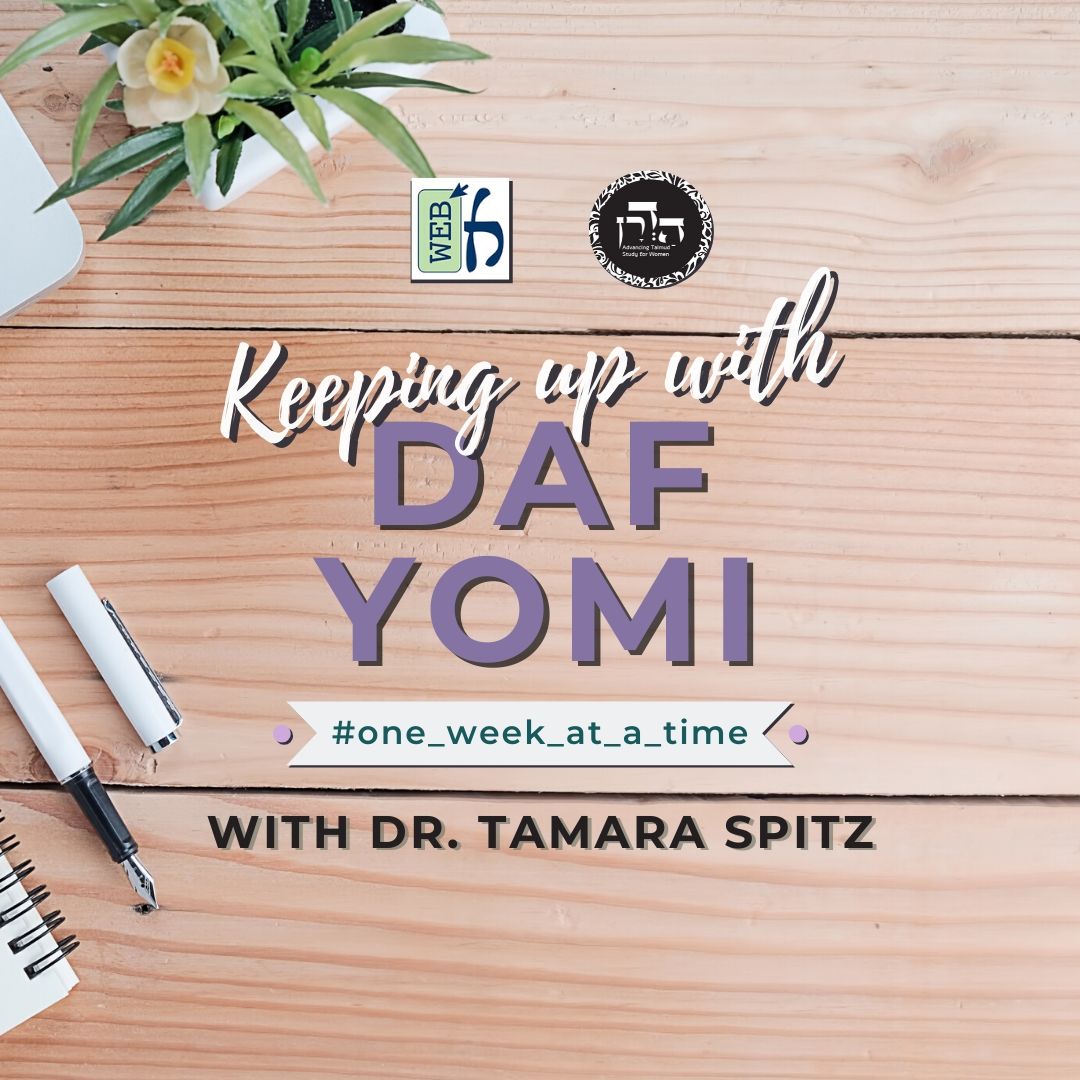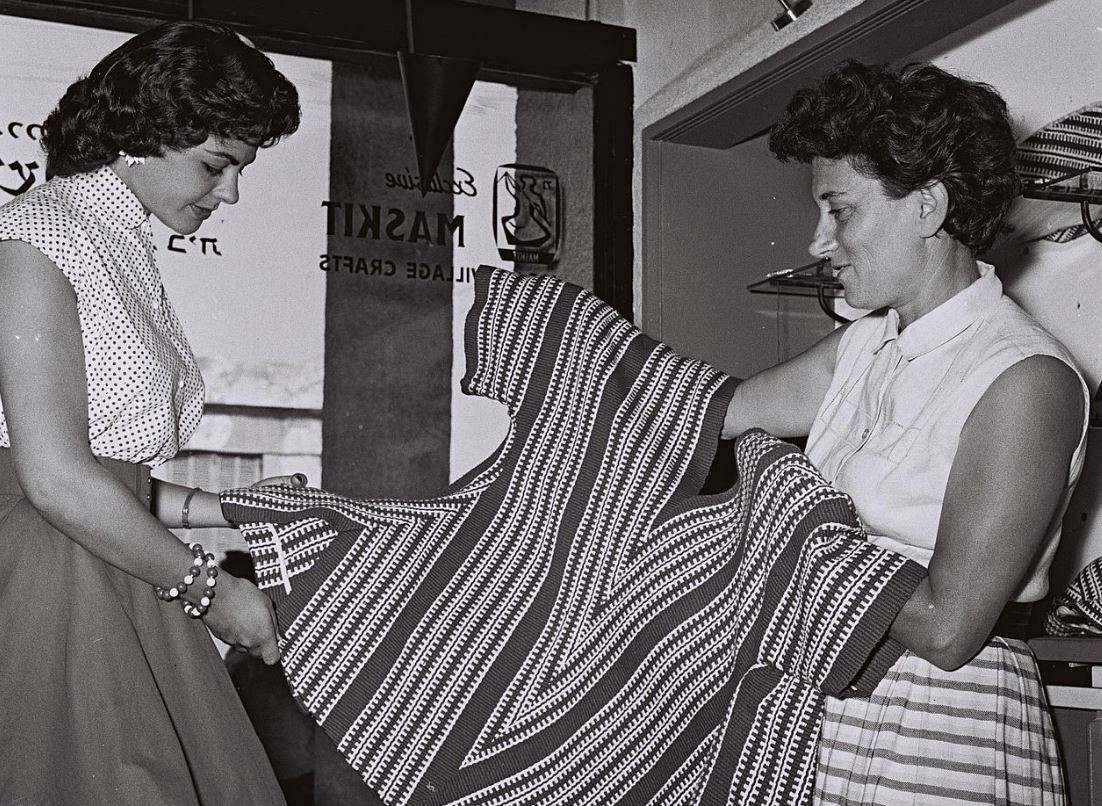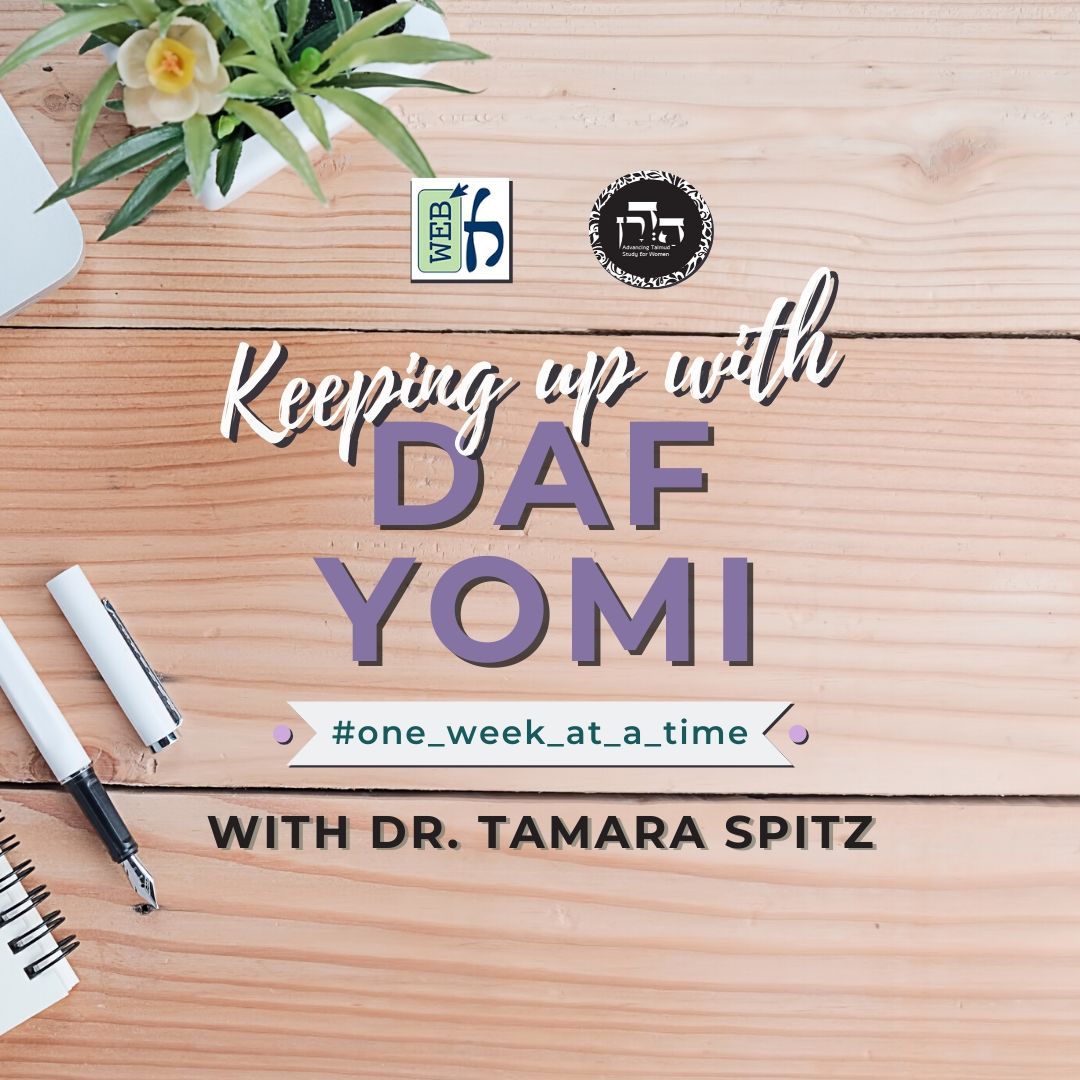Rav holds that ye’ush alone of the original owner causes the item to become the possession of the thief. Rav Sheshet disagrees and three sources are brought to challenge Rav but all are resolved. Rav Sheshet holds that if it is not a complete sale, i.e. if the owner did not despair, there is no four/five payment. Rav Nachman disagrees with Rav Sheshet and also with Rav and requires a thief to pay the four/five payment regardless of whether the owner did/did not despair of the stolen item. Rav holds that since despair of the owner turns the object into the property of the thief, if the sale happened after ye’ush, there is no four/five payment. Rabbi Elazar, Rabbi Yochanan and Reish Lakish also weigh in on this discussion – Rabbi Elazar holds like Rav Sheshet, Rabbi Yochanan like Rav Nachman, and Reish Lakish like Rav.
Bava Kamma 68
Share this shiur:
Bava Kamma
Masechet Bava Kamma is sponsored by the Futornick Family in loving memory of their fathers and grandfathers, Phillip Kaufman and David Futornick.
This week’s learning is sponsored for the merit and safety of Haymanut (Emuna) Kasau, who was 9 years old when she disappeared from her home in Tzfat two years ago, on the 16th of Adar, 5784 (February 25, 2024), and whose whereabouts remain unknown.
This week’s learning is dedicated of the safety of our nation, the soldiers and citizens of Israel, and for the liberation of the Iranian people. May we soon see the realization of “ליהודים היתה אורה ושמחה וששון ויקר”.
Want to dedicate learning? Get started here:


Today’s daily daf tools:
Bava Kamma
Masechet Bava Kamma is sponsored by the Futornick Family in loving memory of their fathers and grandfathers, Phillip Kaufman and David Futornick.
This week’s learning is sponsored for the merit and safety of Haymanut (Emuna) Kasau, who was 9 years old when she disappeared from her home in Tzfat two years ago, on the 16th of Adar, 5784 (February 25, 2024), and whose whereabouts remain unknown.
This week’s learning is dedicated of the safety of our nation, the soldiers and citizens of Israel, and for the liberation of the Iranian people. May we soon see the realization of “ליהודים היתה אורה ושמחה וששון ויקר”.
Today’s daily daf tools:
Delve Deeper
Broaden your understanding of the topics on this daf with classes and podcasts from top women Talmud scholars.
New to Talmud?
Check out our resources designed to help you navigate a page of Talmud – and study at the pace, level and style that fits you.
The Hadran Women’s Tapestry
Meet the diverse women learning Gemara at Hadran and hear their stories.
Bava Kamma 68
מִי אִיכָּא נִשְׁתָּרֵשׁ? אֶלָּא לְאַחַר יֵאוּשׁ. וְאִי סָלְקָא דַעְתָּךְ יֵאוּשׁ קָנֵי, אַמַּאי מְשַׁלֵּם תַּשְׁלוּמֵי אַרְבָּעָה וַחֲמִשָּׁה? שֶׁלּוֹ הוּא טוֹבֵחַ, שֶׁלּוֹ הוּא מוֹכֵר!
is it possible to say that there is any entrenchment in sin? The sale does not take effect, as it occurred before the owner despaired, which means that the thief did not in fact deepen his sin by selling the animal. Rather, it must be that the sale occurred after the owner’s despair. And if it enters your mind that the owner’s despair causes the thief to acquire the animal, why does he pay the fourfold or fivefold payment? Since the animal belongs to him after the owner’s despair, in effect he slaughters his own animal or sells his own animal.
אָמְרִי, כִּדְאָמַר רָבָא: מִפְּנֵי שֶׁשָּׁנָה בַּחֵטְא; הָכָא נָמֵי, מִפְּנֵי שֶׁשָּׁנָה בַּחֵטְא.
The Sages say: It is possible to explain the term: Entrenched in sin, in accordance with what Rava said: The thief is liable because he repeated his sin, i.e., he sinned a second time by going through the motions of the sale, regardless of the fact the sale was not legally binding. Here too, one can say that the thief is liable because he repeated his sin.
תָּא שְׁמַע: ״וּטְבָחוֹ אוֹ מְכָרוֹ״; מַה טְבִיחָה – שֶׁאֵינָהּ חוֹזֶרֶת, אַף מְכִירָה – שֶׁאֵינָהּ חוֹזֶרֶת.
The Gemara suggests: Come and hear a proof from a baraita: It is written: “If a man steal an ox or a sheep, and slaughter it or sell it” (Exodus 21:37). Just as slaughter is an act that cannot be undone, so too the selling referred to here is an act that cannot be undone.
אֵימַת? אִילֵּימָא לִפְנֵי יֵאוּשׁ, אַמַּאי אֵינָהּ חוֹזֶרֶת? אֶלָּא לְאַחַר יֵאוּשׁ. וְאִי סָלְקָא דַעְתָּךְ קַנְיֵיהּ, אַמַּאי מְשַׁלֵּם אַרְבָּעָה וַחֲמִשָּׁה? שֶׁלּוֹ הוּא טוֹבֵחַ, שֶׁלּוֹ הוּא מוֹכֵר!
The Gemara analyzes the baraita: Now, when is a sale irreversible? If we say this sale occurred before the owner’s despair of recovering his stolen animal, why can it not be undone? Since the thief’s sale of the animal before the owner’s despair is ineffective, the sale is easily undone. Rather, the baraita must be speaking about a case where the thief sold the animal after the owner’s despair. And if it enters your mind that a thief acquires a stolen item after the owner’s despair, why does he pay the fourfold or fivefold payment for slaughtering or selling the animal at this point? He slaughters his own animal or he sells his own animal. Apparently, a thief does not acquire the stolen item after the owner’s despair.
כִּדְאָמַר רַב נַחְמָן: פְּרָט לְשֶׁהִקְנָה לִשְׁלשִׁים יוֹם, הָכָא נָמֵי, פְּרָט לְשֶׁהִקְנָה לִשְׁלשִׁים יוֹם.
The Gemara rejects this proof: The explanation for this baraita is as Rav Naḥman said in reference to a different baraita. Rav Naḥman said that when that baraita speaks of a sale that cannot be undone, this excludes one who transferred ownership of the animal to another in a temporary manner, e.g., for thirty days. Here too, one can answer in the same way, that it excludes one who transferred ownership of the animal for thirty days. Accordingly, if one sold the animal permanently, even if the sale was performed before the owner despaired and is therefore not legally binding, he is nevertheless required to pay the fourfold or fivefold payment.
מֵיתִיבִי: גָּנַב וּבָא אַחֵר וּגְנָבוֹ – הָרִאשׁוֹן מְשַׁלֵּם תַּשְׁלוּמֵי כֶפֶל, וְהַשֵּׁנִי אֵינוֹ מְשַׁלֵּם אֶלָּא קֶרֶן בִּלְבָד.
The Gemara raises an objection from another baraita: If one stole an animal, and another person subsequently came and stole it from him, the first thief pays double payment to the owner, and the second thief pays only the principal to the first thief. This is because one who steals from a thief does not pay the double payment, as the mishna teaches.
גָּנַב וּמָכַר, וּבָא אַחֵר וּגְנָבוֹ – הָרִאשׁוֹן מְשַׁלֵּם תַּשְׁלוּמֵי אַרְבָּעָה וַחֲמִשָּׁה, וְהַשֵּׁנִי מְשַׁלֵּם תַּשְׁלוּמֵי כֶפֶל. גָּנַב וְטָבַח, וּבָא אַחֵר וּגְנָבוֹ – הָרִאשׁוֹן מְשַׁלֵּם תַּשְׁלוּמֵי אַרְבָּעָה וַחֲמִשָּׁה, וְהַשֵּׁנִי אֵינוֹ מְשַׁלֵּם תַּשְׁלוּמֵי כֶפֶל, אֶלָּא קֶרֶן בִּלְבָד.
If one stole an animal and sold it, and another individual came and stole it from the purchaser, the first thief pays the fourfold or fivefold payment to the owner, and the second thief pays the double payment to the purchaser, who has become the new owner of the animal. If one stole an animal and slaughtered it, and another person came and stole the slaughtered animal, the first thief pays the fourfold or fivefold payment to the owner, and the second thief does not pay the double payment but only the principal, in accordance with the halakha that one who steals from a thief does not pay the double payment.
קָתָנֵי מִיהָא מְצִיעֲתָא: גָּנַב וּמָכַר, וּבָא אַחֵר וּגְנָבוֹ – הָרִאשׁוֹן מְשַׁלֵּם תַּשְׁלוּמֵי אַרְבָּעָה וַחֲמִשָּׁה, וְהַשֵּׁנִי מְשַׁלֵּם תַּשְׁלוּמֵי כֶפֶל.
The Gemara analyzes this baraita: In any event, the baraita teaches in the middle clause: If one stole an animal and sold it, and another came and stole it from the purchaser, the first thief pays the fourfold or fivefold payment to the owner, and the second thief pays the double payment to the purchaser.
אֵימַת? אִילֵּימָא לִפְנֵי יֵאוּשׁ, שֵׁנִי אַמַּאי מְשַׁלֵּם תַּשְׁלוּמֵי כֶפֶל? שִׁינּוּי רְשׁוּת בְּלֹא יֵאוּשׁ מִי אִיכָּא לְמַאן דְּאָמַר דְּקָנֵי?
When did this sale occur? If we say it happened before the owner’s despair, why does the second thief pay the double payment to the purchaser? Is there anyone who says that a change in possession of a stolen item, i.e., when it leaves the possession of the thief and enters the possession of another, without the additional factor of the owner’s despair, causes the one who has it to acquire the item? There is no such opinion. Therefore, the so-called purchaser of the animal does not become its owner, as the sale is invalid. This should be considered as a case of one who steals from a thief, and consequently there should be no double payment.
אֶלָּא פְּשִׁיטָא לְאַחַר יֵאוּשׁ. וְאִי סָלְקָא דַעְתָּךְ יֵאוּשׁ קוֹנֶה, אַמַּאי מְשַׁלֵּם תַּשְׁלוּמֵי אַרְבָּעָה וַחֲמִשָּׁה? דִּידֵיהּ הוּא דְּזַבֵּין!
Rather, it is obvious that the sale occurred after the owner’s despair. And if it enters your mind that a thief acquires a stolen item after the owner’s despair, why should the first thief pay the fourfold or fivefold payment? After all, it is his own animal that he sold, having acquired it immediately upon the owner’s despair.
וְתוּ, דְּקָתָנֵי רֵישָׁא: גָּנַב, וּבָא אַחֵר וּגְנָבוֹ – רִאשׁוֹן מְשַׁלֵּם תַּשְׁלוּמֵי כֶפֶל, וְהַשֵּׁנִי אֵין מְשַׁלֵּם אֶלָּא קֶרֶן.
And furthermore, consider that which the baraita teaches in the first clause: If one stole an animal, and another subsequently came and stole it from him, the first thief pays the double payment to the owner, and the second thief pays only the principal to the first thief.
מִכְּדֵי לְאַחַר יֵאוּשׁ קָיְימִינַן; וְאִי סָלְקָא דַעְתָּךְ יֵאוּשׁ קוֹנֶה, שֵׁנִי אַמַּאי אֵינוֹ מְשַׁלֵּם אֶלָּא קֶרֶן? אֶלָּא לָאו שְׁמַע מִינַּהּ יֵאוּשׁ לָא קָנֵי, וְקַשְׁיָא לְרַב?
Now, in this baraita we are dealing with a situation after the owner’s despair, as the Gemara just established. And if it enters your mind that the owner’s despair causes the thief to acquire the item, why does the second thief pay only the principal? After the owner has despaired of recovering his item, the thief becomes the owner of the item, and the second thief should have to pay him double payment for stealing his property. Rather, must one not conclude from the baraita that the owner’s despair does not cause the thief to acquire the item? And this presents a difficulty to the opinion of Rav.
אָמַר רָבָא: וְתִסְבְּרָא הָא מְתָרַצְתָּא הִיא?! אֶלָּא דְּקָתָנֵי סֵיפָא: גָּנַב וְטָבַח, וּבָא אַחֵר וּגְנָבוֹ – רִאשׁוֹן מְשַׁלֵּם תַּשְׁלוּמֵי אַרְבָּעָה וַחֲמִשָּׁה, וְשֵׁנִי אֵינוֹ מְשַׁלֵּם אֶלָּא קֶרֶן; וּמִי אִיכָּא לְמַאן דְּאָמַר שִׁינּוּי מַעֲשֶׂה לָא קָנֵי?
Rava said: And can you understand that the text of this baraita is accurate? But consider that which it teaches in the last clause: If one stole an animal and slaughtered it, and another came and stole the slaughtered animal, the first thief pays the fourfold or fivefold payment to the owner, and the second thief pays only the principal to the first thief. And is there anyone who says that a physical change brought about by an action does not cause the thief to acquire the item? There is no such opinion; the thief certainly becomes the owner of the animal after slaughtering it. Consequently, the second thief should have to pay the double payment to the thief for stealing his slaughtered animal. It must therefore be concluded that the text of the baraita has been corrupted and must be reformulated.
אֶלָּא לְעוֹלָם כּוּלַּהּ לִפְנֵי יֵאוּשׁ, וְאֵיפוֹךְ סֵיפָא לִמְצִיעֲתָא וּמְצִיעֲתָא לְסֵיפָא, וְאֵימָא הָכִי: גָּנַב וּמָכַר, וּבָא אַחֵר וּגְנָבוֹ – הָרִאשׁוֹן מְשַׁלֵּם תַּשְׁלוּמֵי אַרְבָּעָה וַחֲמִשָּׁה, וְהַשֵּׁנִי אֵינוֹ מְשַׁלֵּם אֶלָּא קֶרֶן – דְּשִׁינּוּי רְשׁוּת בְּלֹא יֵאוּשׁ לָא קָנֵי.
Rather, actually the entire baraita is referring to the stage before the owner’s despair. And you must reverse the halakha stated in the last clause with that stated in the middle clause, and reverse the halakha stated in the middle clause with that stated in the last clause, and say like this: If one stole an animal and sold it, and another came and stole it from the purchaser, the first thief pays the fourfold or fivefold payment to the owner, and the second thief pays only the principal to the purchaser, as a change in possession without the additional factor of owner’s despair does not cause one to acquire the item.
גָּנַב וְטָבַח, וּבָא אַחֵר וּגְנָבוֹ – הָרִאשׁוֹן מְשַׁלֵּם תַּשְׁלוּמֵי אַרְבָּעָה וַחֲמִשָּׁה, וְהַשֵּׁנִי מְשַׁלֵּם תַּשְׁלוּמֵי כֶפֶל; דְּקַנְיֵיהּ בְּשִׁינּוּי מַעֲשֶׂה.
If one stole an animal and slaughtered it, and another came and stole the slaughtered animal, the first thief pays the fourfold or fivefold payment to the owner, and the second thief pays the double payment to the first thief, as the first thief acquired it through the physical change brought about by an action, i.e., slaughter.
רַב פָּפָּא אָמַר: לְעוֹלָם לָא תֵּיפוֹךְ; סֵיפָא בֵּית שַׁמַּאי הִיא, דְּאָמְרִי: שִׁינּוּי בִּמְקוֹמוֹ עוֹמֵד.
Rav Pappa said: Actually, do not reverse the middle and last clauses of the baraita. With regard to the difficult last clause, it is in accordance with the opinion of Beit Shammai, who say: Even if an item has undergone a physical change, it remains in its place, i.e., a stolen item remains the property of the owner. A thief never attains ownership of it, even if it undergoes a physical change.
אִי הָכִי, קַשְׁיָא רֵישָׁא וּמְצִיעֲתָא לְרַב!
The Gemara asks: If so, if the baraita is not reversed, and if it is referring to the stage after the owner’s despair, then the first clause and the middle clause of the baraita present a difficulty to the opinion of Rav, who maintains that after the owner’s despair the item belongs entirely to the thief.
אָמַר רַב זְבִיד: לְעוֹלָם כּוּלַּהּ לִפְנֵי יֵאוּשׁ, וְהָכָא בְּמַאי עָסְקִינַן – שֶׁנִּתְיָיאֲשׁוּ הַבְּעָלִים בְּלוֹקֵחַ וְלֹא נִתְיָיאֲשׁוּ בְּגַנָּב, דְּהָוֵה לֵיהּ יֵאוּשׁ וְשִׁינּוּי רְשׁוּת.
Rav Zevid said: Actually, the entire baraita is dealing with the stage before the owner’s despair. And with what are we dealing here, in the middle clause of the baraita? We are dealing with a case where the owners despaired of recovering the item when it was already in the possession of the purchaser, but they had not yet despaired when the item was in the possession of the thief. The purchaser is considered the owner because after the despair occurred, there were two factors in play, both the owner’s despair and a change in possession. The combination of these two factors effects acquisition of the item on behalf of the purchaser.
וְלָא תֵּימָא מִשּׁוּם דְּבָעֵינַן יֵאוּשׁ וְשִׁינּוּי רְשׁוּת, אֶלָּא אֲפִילּוּ בְּיֵאוּשׁ לְחוֹדֵיהּ נָמֵי קָנֵי גַּבֵּי גַנָּב;
Rav Zevid continues: And do not say that in the middle clause the reason the owner’s item is acquired by another is only because we require two factors, i.e., the owner’s despair and change of possession. Rather, even in a case of the owner’s despair by itself, the item is acquired by the thief, in accordance with Rav’s opinion that despair alone effects acquisition on behalf of the thief.
אֶלָּא דְּלָא מַשְׁכַּחַתְּ דִּמְשַׁלְּמִי תַּרְוַיְיהוּ גַּנָּב רִאשׁוֹן וְגַנָּב שֵׁנִי, אֶלָּא בְּהָכִי.
Nevertheless, the baraita chose a case in which both of these factors are present because you will not find a case in which both of them, the first thief and the second thief, pay a penalty except in such a case. The first thief pays the fourfold or fivefold payment, and the second thief pays the double payment. Had the owner despaired before the sale, the first thief would have been considered the owner and would therefore be exempt from the additional payment.
אִיתְּמַר: הַמּוֹכֵר לִפְנֵי יֵאוּשׁ – רַב נַחְמָן אָמַר: חַיָּיב, רַב שֵׁשֶׁת אָמַר: פָּטוּר.
§ It was stated: With regard to a thief who sells a stolen animal before the owner’s despair, Rav Naḥman says: He is liable to pay the fourfold or fivefold payment, despite the fact that the sale is invalid. Rav Sheshet says: He is exempt from this payment.
רַב נַחְמָן אָמַר חַיָּיב – ״וּמְכָרוֹ״ אָמַר רַחֲמָנָא, וְהָא זַבֵּין; לָא שְׁנָא לִפְנֵי יֵאוּשׁ, לָא שְׁנָא לְאַחַר יֵאוּשׁ. רַב שֵׁשֶׁת אָמַר פָּטוּר – חִיּוּבֵיהּ לְאַחַר יֵאוּשׁ הוּא, דְּאַהֲנוֹ מַעֲשָׂיו; אֲבָל לִפְנֵי יֵאוּשׁ דְּלָא אַהֲנוֹ מַעֲשָׂיו – לָא מִיחַיַּיב; דֻּומְיָא דִּטְבִיחָה בָּעֵינַן, דְּאַהֲנוֹ מַעֲשָׂיו.
The two amora’im explain the reasons for their respective rulings. Rav Naḥman says: He is liable, because the Merciful One states with regard to the fourfold or fivefold payment: “And slaughter it or sell it” (Exodus 21:37), and he has sold it. There is no difference if the sale occurs before despair, and there is no difference if it takes place after despair. Rav Sheshet says: He is exempt, as his liability is in effect only if he sells the animal after the owner’s despair, when his action, i.e., the sale, is effective. But if he sells it before the owner’s despair, when his action is not effective, he is not liable, as we require that the sale be similar to the slaughter, as they are mentioned together, and when he slaughters the animal his action is effective.
אָמַר רַב שֵׁשֶׁת: מְנָא אָמֵינָא לָהּ? דְּתַנְיָא, אָמַר רַבִּי עֲקִיבָא: מִפְּנֵי מָה אָמְרָה תּוֹרָה טָבַח וּמָכַר מְשַׁלֵּם אַרְבָּעָה וַחֲמִשָּׁה? מִפְּנֵי שֶׁנִּשְׁתָּרֵשׁ בַּחֵטְא.
Rav Sheshet said: From where do I say he is exempt? As it is taught in a baraita that Rabbi Akiva said: For what reason did the Torah say that a thief who slaughtered or sold a stolen animal pays the fourfold or fivefold payment? It is because he has become entrenched in sin by slaughtering or selling the animal he stole.
אֵימַת? אִילֵּימָא לִפְנֵי יֵאוּשׁ, מִי אִיכָּא נִשְׁתָּרֵשׁ? אֶלָּא לָאו לְאַחַר יֵאוּשׁ הוּא? אָמַר רָבָא: מִפְּנֵי שֶׁשָּׁנָה בַּחֵטְא.
Rav Sheshet analyzes the baraita: When did this sale, referred to by Rabbi Akiva, occur? If we say that it happened before the owner’s despair, is it possible that there is any entrenchment in sin here? A sale before the owner’s despair is invalid, which means there is no deepening of his earlier sin. Rather, is it not the case that this is referring to a sale after the owner’s despair? Rava said: This is not a proof, as one can explain that the thief is entrenched in sin because he repeated his sin, i.e. sinned a second time, by his act of sale, regardless of the fact that the sale is invalid.
תָּא שְׁמַע: ״וּטְבָחוֹ וּמְכָרוֹ״; מָה טְבִיחָה – שֶׁאֵינָהּ חוֹזֶרֶת, אַף מְכִירָה – שֶׁאֵינָהּ חוֹזֶרֶת. אֵימַת? אִילֵּימָא לִפְנֵי יֵאוּשׁ, אַמַּאי אֵינָהּ חוֹזֶרֶת? אֶלָּא לְאַחַר יֵאוּשׁ – וּשְׁמַע מִינַּהּ חִיּוּבָא לְאַחַר יֵאוּשׁ הוּא! תַּרְגְּמַהּ רַב נַחְמָן: פְּרָט לְשֶׁהִקְנָה לוֹ לִשְׁלשִׁים יוֹם.
The Gemara suggests: Come and hear a proof for the opinion of Rav Sheshet from a different baraita: It is written: “And slaughter it or sell it” (Exodus 21:37). Just as slaughter is an act that cannot be undone, so too the selling referred to here is an act that cannot be undone. The Gemara analyzes this baraita: When did this sale take place? If we say that it happened before the owner’s despair of recovering his stolen item, why can it not be undone? The thief’s sale of the animal is invalid before the owner’s despair, and therefore the sale is easily undone. Rather, it must be referring to a sale that took place after the owner’s despair. And one can conclude from the baraita that there is liability to pay the fourfold or fivefold payment only if the animal is sold after the owner’s despair. Rav Naḥman rejected this proof, as he interpreted that baraita as serving to exclude one who transferred ownership of the animal temporarily, e.g., for thirty days.
וְאַף רַבִּי אֶלְעָזָר סָבַר חִיּוּבֵיהּ לְאַחַר יֵאוּשׁ הוּא, דְּאָמַר רַבִּי אֶלְעָזָר:
The Gemara adds: And Rabbi Elazar also holds that the liability of a thief to pay the fourfold or fivefold payment applies if he sells it after the owner’s despair of recovering his stolen animal, as Rabbi Elazar says:
תֵּדַע שֶׁסְּתָם גְּנֵיבָה יֵאוּשׁ בְּעָלִים הוּא –
Know that an ordinary case of theft is assumed to result in the owner’s despair of recovering the stolen item. In other words, in the absence of evidence to the contrary, one may assume that the victim of theft has despaired of recovering his item.
שֶׁהֲרֵי אָמְרָה תּוֹרָה: טָבַח וּמָכַר – מְשַׁלֵּם תַּשְׁלוּמֵי אַרְבָּעָה וַחֲמִשָּׁה. וְדִלְמָא לָא אִיָּיאַשׁ! אֶלָּא לָאו מִשּׁוּם דְּאָמְרִינַן: סְתָם גְּנֵיבָה – יֵאוּשׁ בְּעָלִים הִיא.
The reason is that the Torah stated that if a thief slaughtered or sold the animal he had stolen, he pays the fourfold or fivefold payment. But why is this so? Perhaps the owner did not yet despair at the time the thief sold the animal, in which case the sale is invalid, and there should be no fourfold or fivefold payment. Rather, is it not because we say that an ordinary case of theft is assumed to result in the owner’s despair of recovering the stolen item? This concludes the statement of Rabbi Elazar, which clearly indicates that there is no fourfold or fivefold payment if the animal is sold before the owner’s despair.
וְדִלְמָא אַף עַל גַּב דְּלָא אִיָּיאַשׁ!
The Gemara asks a question with regard to Rabbi Elazar’s assumption: But perhaps the Torah obligates the thief to pay the fourfold or fivefold payment even if the owner has not yet despaired at the time of the sale, despite the fact that the sale is invalid, as Rav Naḥman stated.
אָמְרִי: לָא סָלְקָא דַּעְתָּךְ; דּוּמְיָא דִטְבִיחָה – מָה טְבִיחָה דְּאַהֲנוֹ מַעֲשָׂיו, אַף מְכִירָה דְּאַהֲנוֹ מַעֲשָׂיו. וְאִי לִפְנֵי יֵאוּשׁ, מַאי אַהֲנוֹ?
In response to this question the Sages say: This cannot enter your mind, as Rabbi Elazar maintains that the juxtaposition of slaughtering and selling in the verse that states: “And slaughter it or sell it,” teaches that the thief’s sale of the animal is similar to his slaughter of it. Just as slaughter is a matter in which his action was effective, so too, the case of selling the animal is one in which his action was effective, i.e., the sale is valid. And if the sale occurred before the owner’s despair, in what sense were his actions effective?
וְדִלְמָא דְּשַׁמְעִינֵיהּ דְּאִיָּיאַשׁ! אָמְרִי: לָא סָלְקָא דַּעְתָּךְ; דּוּמְיָא דִטְבִיחָה – מָה טְבִיחָה לְאַלְתַּר, אַף מְכִירָה לְאַלְתַּר.
The Gemara asks another question with regard to Rabbi Elazar’s reasoning: But perhaps the Torah requires the fourfold or fivefold payment only in the specific case where the animal is sold after we heard that the owner despaired of its recovery. The Sages respond to this and say: This cannot enter your mind, since, as explained above, the thief’s sale of the animal must be similar to his slaughter of it. Therefore, just as the thief is liable to pay the fourfold or fivefold payment for slaughtering the animal even if he does so immediately, so too, the halakha that he pays the fourfold or fivefold payment for selling it applies even if he does so immediately, before it is known that the owner has despaired of recovering the animal.
אָמַר לוֹ רַבִּי יוֹחָנָן: גְּנֵיבָה בְּנֶפֶשׁ תּוֹכִיחַ – שֶׁאֵין יֵאוּשׁ בְּעָלִים, וְחַיָּיב! מִכְּלָל דְּסָבַר רַבִּי יוֹחָנָן: לִפְנֵי יֵאוּשׁ חַיָּיב.
Rabbi Yoḥanan said to Rabbi Elazar: The case of stealing a human being, i.e., kidnapping, proves that your reasoning is incorrect. The Torah states: “And he who steals a man and sells him or if he is found in his hand, he shall be put to death” (Exodus 21:16). In this case there is no owner’s despair, as no one ever despairs of his own freedom. Consequently, the thief’s sale of the person he kidnapped is invalid, and yet the Torah states that he is liable to receive the death penalty for selling him. One can learn by inference from this question that Rabbi Yoḥanan holds that if the thief sells the stolen animal before the owner’s despair he is liable to pay the fourfold or fivefold payment.
לְאַחַר יֵאוּשׁ מַאי? רַבִּי יוֹחָנָן אָמַר: חַיָּיב, וְרֵישׁ לָקִישׁ אָמַר: פָּטוּר.
§ The Gemara asks: If the thief sells the animal after the owner’s despair, what is the halakha? Rabbi Yoḥanan says: He is liable. And Reish Lakish says: He is exempt.
רַבִּי יוֹחָנָן אָמַר חַיָּיב – חִיּוּבֵיהּ בֵּין לִפְנֵי יֵאוּשׁ, בֵּין לְאַחַר יֵאוּשׁ. רֵישׁ לָקִישׁ אָמַר פָּטוּר – חִיּוּבֵיהּ לִפְנֵי יֵאוּשׁ הוּא, אֲבָל לְאַחַר יֵאוּשׁ – קָנָה, וְשֶׁלּוֹ הוּא טוֹבֵחַ וְשֶׁלּוֹ הוּא מוֹכֵר.
The Gemara elaborates: Rabbi Yoḥanan says: He is liable, as the thief’s liability applies whether the animal is sold before the owner’s despair or after his despair. Reish Lakish says: He is exempt, as the thief’s liability is in effect only if he sells the animal before the owner’s despair, but after the owner’s despair there is no liability, because the thief has acquired the animal by virtue of the owner’s despair, and therefore it is his own animal that he slaughters or his own animal that he sells.
אֵיתִיבֵיהּ רַבִּי יוֹחָנָן לְרֵישׁ לָקִישׁ: גָּנַב וְהִקְדִּישׁ, וְאַחַר כָּךְ טָבַח – מְשַׁלֵּם תַּשְׁלוּמֵי כֶפֶל, וְאֵינוֹ מְשַׁלֵּם תַּשְׁלוּמֵי אַרְבָּעָה וַחֲמִשָּׁה.
Rabbi Yoḥanan raised an objection to the opinion of Reish Lakish from a baraita: If one stole an animal and consecrated it, and subsequently slaughtered it, he pays the double payment to the owner of the animal, but he does not pay the fourfold or fivefold payment. The Torah states: “The one whom the judges convict shall pay double to his neighbor” (Exodus 22:8). The word “neighbor” excludes the case of one who steals a consecrated item from the Temple treasury. Since there is no double payment to the Temple treasury there can be no fourfold or fivefold payment either, as the fourfold or fivefold payment is considered an addition to, not a replacement of, the double payment (see 75a). Therefore, a thief does not pay the fourfold or fivefold payment to the Temple treasury for slaughtering one of its animals.
אֵימַת? אִלֵּימָא לִפְנֵי יֵאוּשׁ, מִי קָדוֹשׁ?! ״אִישׁ כִּי יַקְדִּשׁ אֶת בֵּיתוֹ קֹדֶשׁ״ אָמַר רַחֲמָנָא – מָה בֵּיתוֹ שֶׁלּוֹ, אַף כֹּל שֶׁלּוֹ!
The Gemara analyzes the baraita: When did the events described in the baraita occur? If we say they happened before the owner’s despair, is the animal consecrated at all? A thief cannot consecrate a stolen item before the owner despairs of recovering it, as the Merciful One states in the Torah: “And when a man shall sanctify his house to be holy unto the Lord” (Leviticus 27:14), from which it is derived: Just as one’s house belongs to him, so too, anything that one consecrates must belong to him, and therefore a thief cannot consecrate a stolen item.
אֶלָּא פְּשִׁיטָא לְאַחַר יֵאוּשׁ; וְטַעְמָא דְּהִקְדִּישׁ הוּא דְּאֵינוֹ מְשַׁלֵּם תַּשְׁלוּמֵי אַרְבָּעָה וַחֲמִשָּׁה, דְּכִי קָא טָבַח – דְּהֶקְדֵּשׁ קָא טָבַח, אֲבָל לֹא הִקְדִּישׁ – טָבַח מְשַׁלֵּם תַּשְׁלוּמֵי אַרְבָּעָה וַחֲמִשָּׁה. וְאִי סָלְקָא דַעְתָּךְ יֵאוּשׁ קוֹנֶה, אַמַּאי מְשַׁלֵּם? שֶׁלּוֹ הוּא טוֹבֵחַ, שֶׁלּוֹ הוּא מוֹכֵר!
Rather, it is obvious that the baraita is dealing with events that occurred after the owner’s despair. And yet the only reason that he does not pay the fourfold or fivefold payment is that he consecrated the animal, on the grounds that when he slaughtered it he slaughtered consecrated property. But if he did not consecrate the animal before he slaughtered it he would pay the fourfold or fivefold payment. And if it enters your mind that the owner’s despair serves to acquire the animal for the thief, why would he have to pay? At that point it is his own animal that he slaughters or his own animal that he sells.
אֲמַר לֵיהּ: הָכָא בְּמַאי עָסְקִינַן – כְּגוֹן שֶׁהִקְדִּישׁוּהוּ בְּעָלִים בְּיַד גַּנָּב.
Reish Lakish said to Rabbi Yoḥanan: With what are we dealing here? The baraita is referring to a case that occurred before the owner’s despair, and it is not the thief who consecrated the animal, as he cannot do so. Rather, we are dealing with a case where the owner consecrated the animal while it was in the thief’s possession.
וּמִי קָדוֹשׁ?! וְהָאָמַר רַבִּי יוֹחָנָן: גָּזַל וְלֹא נִתְיָיאֲשׁוּ הַבְּעָלִים – שְׁנֵיהֶן אֵינָן יְכוֹלִין לְהַקְדִּישׁ, זֶה לְפִי שֶׁאֵינוֹ שֶׁלּוֹ, וְזֶה לְפִי שֶׁאֵינוֹ בִּרְשׁוּתוֹ! אָמְרִי: הוּא דְּאָמַר – כִּצְנוּעִין,
The Gemara asks: And is the animal consecrated in this situation? But didn’t Rabbi Yoḥanan say: If one stole an item and the owner has not yet despaired of recovering it, neither of them is able to consecrate it. This one, the thief, cannot consecrate the item, because it does not belong to him; and that one, the owner, cannot consecrate it, because it is not in his possession. The Sages state an answer on behalf of Reish Lakish: He stated his opinion in accordance with the opinion of the pious ones [tzenuin], who acted not in accordance with the opinion of Rabbi Yoḥanan.
דִּתְנַן: הַצְּנוּעִין מַנִּיחִין אֶת הַמָּעוֹת, וְאוֹמְרִים: כׇּל הַנִּלְקָט מִזֶּה, יְהֵא מְחוּלָּל עַל הַמָּעוֹת הָאֵלּוּ.
As we learned in a mishna (Ma’aser Sheni 5:1): The pious ones would set aside some coins and say: Anything that was picked from this vine by passersby shall be desacralized onto these coins. This mishna is referring to a grapevine in its fourth year after planting. The grapes on this vine must be either eaten in Jerusalem or redeemed with money that is then taken to Jerusalem and spent on food. The fruit may not be eaten outside Jerusalem without being redeemed. The pious ones were concerned that a passerby might help himself to some of their grapes, thereby transgressing a prohibition. Therefore, they would redeem any of their grapes that might be picked and eaten by passersby. Evidently, these pious ones were of the opinion that the owner of a stolen item can redeem it despite the fact that it is no longer in his possession. Likewise, they would say, contrary to the opinion of Rabbi Yoḥanan, that an owner of a stolen item can consecrate it even though it is no longer in his possession.
וַהֲרֵי חָזְרָה קֶרֶן לַבְּעָלִים!
The Gemara asks a question with regard to Reish Lakish’s explanation of the baraita, that it is discussing a case where the owner of the animal consecrated it after it was stolen: But the principal amount, i.e., the stolen animal itself, has returned to the owner. By consecrating the animal, the owner has exercised his ownership of it, and it is therefore considered to have been returned to him at that point. The thief should therefore not be required to pay the double payment, as a thief is liable for double payment only when the stolen item is in his possession at the time of the trial, as it states: “The theft shall be found in his hand” (Exodus 22:3).
כְּשֶׁעָמַד בַּדִּין.
The Gemara answers: The baraita is discussing a case where the thief stood in judgment and was found guilty of theft before the owner consecrated the animal. Consequently, the liability to pay the double payment preceded the owner’s consecration of his property.
הֵיכִי דָמֵי? אִי דְּאָמְרִי ״צֵא תֵּן לוֹ״ – מַאי אִירְיָא הִקְדִּישׁ? אֲפִילּוּ לֹא הִקְדִּישׁ נָמֵי לָא לִיחַיְּיבֵיהּ!
The Gemara raises a difficulty with regard to this answer: What are the circumstances of this trial of the thief? If it refers to a situation where the members of the court say to him: Go out and give the animal back to its owner, why does the baraita say that the thief is exempt from the fourfold or fivefold payment specifically because the owner consecrated the animal before it was slaughtered? Even if he did not consecrate it the thief should also not be liable to pay the fourfold or fivefold payment.
דְּאָמַר רָבָא: ״צֵא תֵּן לוֹ״, טָבַח וּמָכַר – פָּטוּר. מַאי טַעְמָא?
The Gemara elaborates. As Rava says: If the court tells a thief: Go out and give the stolen animal back to the owner and instead the thief slaughtered or sold it, he is exempt from the fourfold or fivefold payment. What is the reason for this?
כֵּיוָן דְּפַסְקוּהָ לְמִילְּתֵיהּ וְטָבַח וּמָכַר – הָוֵה לֵיהּ גַּזְלָן, וְגַזְלָן אֵינוֹ מְשַׁלֵּם תַּשְׁלוּמֵי אַרְבָּעָה וַחֲמִשָּׁה.
Since the court has issued a definitive ruling in this matter, and he later slaughtered or sold the animal, he is considered a robber, and a robber does not pay the fourfold or fivefold payment. The difference between a thief, concerning whom the Torah prescribes the double payment and the fourfold or fivefold payment, and a robber, who does not incur these obligations, is that a thief acts stealthily, whereas a robber brazenly uses force to take an item from its owner. Once a court has obligated a thief to make restitution and he has defied this sentence, he is considered a robber, and therefore the fourfold or fivefold payment and its atonement are not applicable to him.






